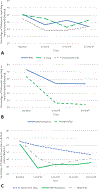Brief Motivational Interventions Are Associated with Reductions in Alcohol-Induced Blackouts Among Heavy Drinking College Students
- PMID: 30973651
- PMCID: PMC6502647
- DOI: 10.1111/acer.14019
Brief Motivational Interventions Are Associated with Reductions in Alcohol-Induced Blackouts Among Heavy Drinking College Students
Abstract
Background: Alcohol-induced blackouts, a form of anterograde amnesia that restricts the encoding of short-term memories into long-term ones, are among the most severe alcohol-related consequences. College students are at high risk of experiencing alcohol-induced blackouts, and there is a need to determine whether alcohol interventions can effectively reduce blackouts in this population. The current study uses data from 3 randomized clinical trials to examine the effect of various intervention approaches on alcohol-induced blackouts.
Methods: Four interventions were compared over 3 studies: (i) a computerized feedback intervention (electronic Check-Up To Go [e-Chug]; Study 1); (ii) a single-session brief motivational intervention (BMI; Study 1); (iii) a BMI plus behavioral economic session focused on increasing substance-free activities (BMI + Substance-Free Activity Session [SFAS]; Studies 2 and 3); and (iv) a BMI plus supplemental Relaxation Training session (BMI + Relaxation Training; Studies 2 and 3). Studies 1 and 3 also included an assessment-only control condition. For each study, participants reported whether they had experienced an alcohol-induced blackout at each time point; binary logistic regressions examined differential likelihood of experiencing an alcohol-induced blackout over time.
Results: Neither the single-session BMI nor e-Chug reduced alcohol-induced blackouts over assessment only; however, participants in the BMI + SFAS or BMI + Relaxation Training condition were significantly less likely to experience an alcohol-induced blackout compared to assessment only at 1-month (Wald = 4.77, odds ratio [OR] = 0.53, p = 0.03) and 6-month follow-ups (Wald = 5.72, OR = 0.52, p = 0.02). Study 2 also revealed a larger effect for the BMI + SFAS over the BMI + Relaxation Training condition at 6 months (Wald = 4.11 OR = 0.22, p = 0.043), although this was not replicated in Study 3. The effects for the 2-session BMIs lasted 6 months, at which point maturation effects diminished differences between assessment-only and intervention conditions.
Conclusions: Two sessions of BMI are a substantial enough dose to result in reductions in alcohol-induced blackouts among college student heavy drinkers.
Keywords: Alcohol-Induced Blackouts; Brief Motivational Interventions; College Students.
© 2019 by the Research Society on Alcoholism.
Figures

References
-
- American College Health Association (2015) American College Health Association-National College Health Assessment II: Reference Group Executive Summary Spring 2015. Hanover, MD: American College Health Association; 2015.
-
- Carey KB (2012) Brief Motivational Interventions In: College Student Alcohol Abuse: A Guide to Assessment, Intervention, and Prevention (Correia CJ, Murphy JG, Barnett NP eds), pp 218–245. Hoboken, New Jersey, John Wiley & Sons, Ltd.

